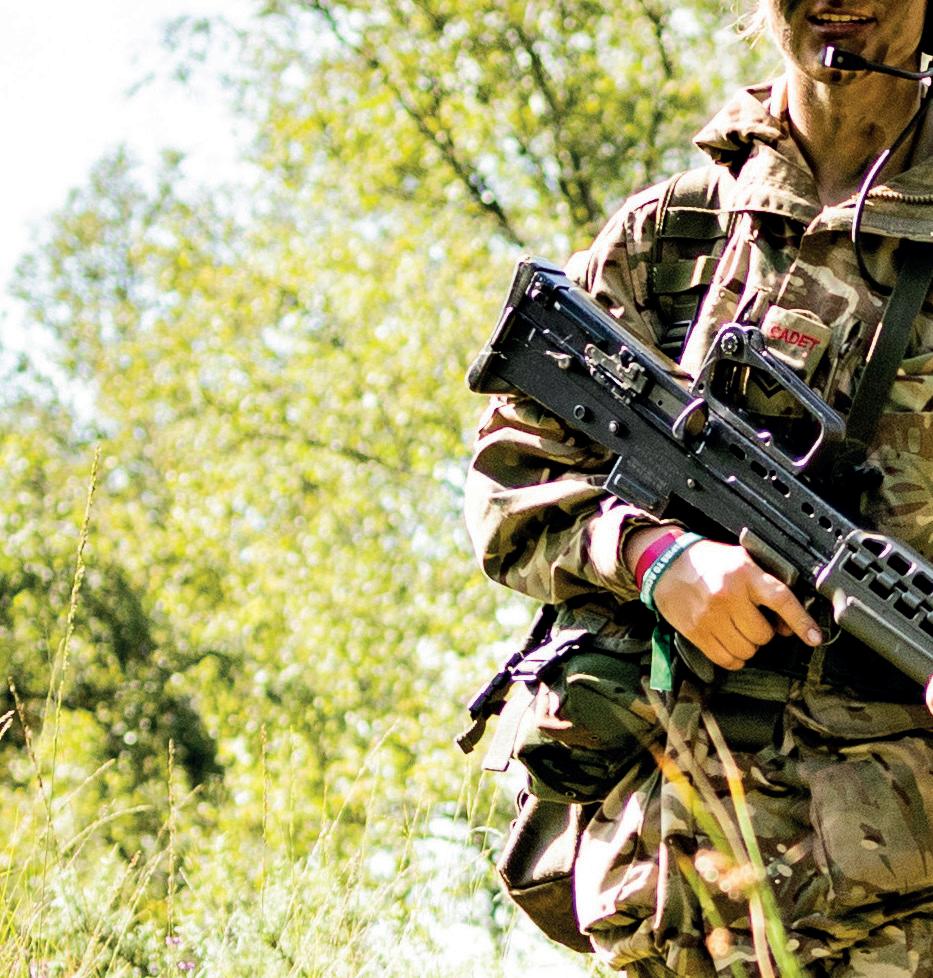






































Are you looking for a dynamic, progressive, experienced recruitment agency to support your business needs? We can supply a tailored solution for whatever your recruitment requirements, whilst providing dedicated support for the Armed Forces community.

With years of experience, our experts have lived the day-to-day demands of the industry and understand what it takes to help you succeed. With proven expertise in recruiting across the driving and logistics industries at all levels, we can help source:





Class 1 and Class 2 drivers
ADR drivers
3.5T and 7.5T drivers
Tra c planners and managers
And more!
Contact us now to fi nd out more information about our tailored recruitment solutions.


We’re proud to say that we have received the silver award from the Defence Employer Recognition Scheme, for commitment to supporting the Armed Forces community through employment. We look forward to continuing this support helping ex-service personnel secure jobs.
PUBLISHER


Denise Connelly denise@dcpublishing.co.uk
EDITOR
Emma Storr emma.storr@dcpublishing.co.uk
DESIGN AND PRODUCTION

Lucy Baillie lucy.baillie@dcpublishing.co.uk
SALES
Marian Mathieson marian.mathieson@dcpublishing.co.uk
EDITORIAL CONTRIBUTORS
Kate Stevenson
www.advancemagazine.co.uk
Welcome
The decision to leave the Armed Forces and return to civilian life will be one of the biggest choices you ever make: it can be life-changing for not only you, but your network of loved ones, too. During this time, you will have a lot of important decisions to make, and luckily, there are specialist organisations and charities there to help you every step of the way. Inside this issue of Advance, you can find a plethora of advice, information and guidance that can aid you whether you are just considering your next steps, in the middle of the resettlement process, or you have just made your return to civilian life.

9 UNDERSTANDING ELCAS
How the Enhanced Learning Credits Scheme can help fund education.
If you’d like a free copy of Advance delivered to your door, head to our website. advancemagazine.co.uk/subscribe
13 EMPOWERMENT THROUGH TRAINING
As you start a new chapter, the right training could help you land a new role.
16 A CHANCE TO RETRAIN Access specialist training with leading provider Sava.
WELLBEING
26 NURTURING YOUR MENTAL HEALTH
During this transition, it is essential to prioritise your mental wellbeing.
30 REMOVING SHAME FROM ISOLATION
The organisations offering support for loneliness.
SUPPORT
@AdvanceMagUK
4 REACHING OUT Find support for careers, health and more.
Discover support with everything from training opportunities, finding your next job, and starting your own business, to help for the whole family, how you can care for your mental health, and a rundown of organisations and charities offering meaningful support in different areas.
6 RESETTLING WITH CONFIDENCE
A rundown of what you need to know as you start the process.
28 SEEKING FAMILY SUPPORT

Accessing help for the whole family unit.
WORK
10 IDENTIFYING YOUR SKILLS
Translating your skillset into civilian terms during the job process.
18 DRIVING YOUR CAREER FORWARD
Discover if a role in driving or logistics is right for you.

21 FORGING A NEW PATH
Could you start your own business on civvy street?
23 BECOME A HIDDEN HERO
Why you should pursue a career on the frontline.
25 UNLOCKING NEW POSSIBILITIES
Embark on a new chapter with TVS Supply Chain Solutions.
18

Attempting to navigate life after working in the Armed Forces can be overwhelming. There is lots to consider and your to do list can feel never-ending. SSAFA (www. ssafa.org.uk, 0800 260 6767) and Veteran’s UK (www.gov.uk, 0808 1914 218) offer helplines which you can call for guidance. Both will be able to signpost you to support or help you themselves.
Rising housing costs and high property demand can make resettling a challenge. The Haig Housing Trust (www.haighousing. org.uk) and STOLL (www.stoll.org. uk) serve the ex-Forces community by helping them to find homes. They provide social housing and support to service leavers and their families when transitioning into civilian life.
If you are at risk of homelessness or rough sleeping, Veterans Aid (0800 012 6867) and charity Shelter (www.shelter.org.uk) can help you to find emergency accommodation.
Finding a job after enlistment that matches your specific personnel skillset might seem challenging, but the trick is to translate your Forces-coded skills into civilian ones. For example, working in a serving troop demonstrates your ability to work in a team, while rank structure, such as a soldier beneath a lieutenant, shows your ability to follow orders and complete tasks successfully. Discover more on page 10. The Forces Employment Charity (www.forcesemployment.org. uk) and The Poppy Factory (www. poppyfactory.org) can help veterans to overcome employment barriers by providing support, training and job opportunities after enlistment.
During this time, you might get caught up in the paperwork and legalities of resettling and forget to think about your physical and mental health. Overwhelmed by the administration, the process could affect your mental health and wellbeing. Charities such as Veterans at Ease
(www.veteransatease.org), Combat Stress (www.combatstress.org.uk) and Head Up (www.head-up.org.uk) are committed to helping veterans navigate civilian life by supporting their mental health.
Blind Veterans UK (www. blindveterans.org.uk) helps people who are blind or visually impaired to rebuild their lives after enlistment. The charity provides practical resources such as rehabilitation, training and emotional support.
The Not Forgotten Association (www.thenotforgotten.org) provide support for wounded and disabled ex-service people. As an organisation, they aim to tackle the key issues this group faces, such as isolation, loneliness and poor mental health. By offering practical support, they hope to help veterans live an everyday life.
British Limbless Ex-Service Mens Association (www.blesma.org) assist ex-veterans who have suffered from a life-changing limb loss. The non-profit’s mission is to support ex-personnel so that they can lead independent and fulfilling lives.
Leaving the Armed Forces and navigating the resettlement process can be difficult. Luckily, there is help readily available and organisations on hand that can support you at every stage









As you approach the end of your military career, the prospect of transitioning from the structure of the Armed Forces to civilian life can be both exciting and daunting. As you set your sights on a new path, the resettlement process awaits you. The process can feel overwhelming, so you can use this as a breakdown of the different stages of this journey, with insights and guidance to ensure you have a smooth transition back to civilian life.

The resettlement process can vary depending on each individual and their specific circumstances, however, it typically starts around two years before your intended discharge date. This timeline gives you the opportunity to attend various workshops, training programs, and careers fairs to prepare for your life beyond the Armed Forces.
The first step is preparation, which usually starts around 12-24 months before discharge. During this phase,

Leaving the Armed Forces will be one of the biggest changes of your life, but there is help available every step of the way
“The transition to civilian life is filled with opportunities to embrace new experiences”
you’ll have access to a wealth of resources and support.
You can attend career transition workshops where you can explore different career paths, assess your skills, and tailor your CV to appeal to civilian employers with the support of experts.
During this time, you should consider seeking advice from the Career Transition Partnership (CTP). The organisation provides a range of guidance and can help you to make connections with potential employers. All service leavers have access to this information for free.
As you approach your discharge date, several essential factors come into play. From employment to education and housing, there’s a lot to consider.
When considering your future employment, think about your desired career and how your military experience aligns with civilian roles. Leverage the skills you have acquired during your service, such as leadership, teamwork, discipline, and problem-solving, to stand out in interviews. Consider reaching out to employers who value military experience and understand its significance.
If you plan to pursue further education in order to follow your new career of choice, explore available grants and scholarships for veterans, as well as educational programs that cater to your specific interests and career goals.
As you plan your transition, decide whether you’ll return to your hometown or explore new places for your civilian life. Take advantage of housing schemes designed for ex-service personnel, and research the cost of living in your chosen area before making a final decision.
It’s important to evaluate your financial situation to ensure a smooth transition. If you are retiring, then understanding your pension options and entitlements is essential. If you are unsure, you could seek advice from financial advisors who specialise in helping Armed Forces leavers.
The final preparations will start around six to 12 months before discharge. As your discharge date nears, it’s time to finalise your plans and tie up any loose ends. Notify the relevant authorities, such as the Ministry of Defence (MOD), of your decision to leave the Armed Forces. Use this period to polish your interview skills, attend networking events, and make connections in your chosen field.
When your discharge date arrives, your time in the Armed Forces comes to an end, and emotions may run high. Focus on the exciting opportunities that lie ahead and stay connected with fellow service leavers who can provide valuable support during this phase.
As you go through the resettlement process, you don’t have to navigate this transition alone. Various organisations and resources are dedicated to assisting Armed Forces leavers during this time.
CTP (www.ctp.org.uk): This organisation offers a comprehensive range of services, including career guidance, job search assistance, and training opportunities.

The Royal British Legion (www. britishlegion.org.uk): The Legion provides practical, emotional, and financial support to members of the British Armed Forces community, including service leavers, veterans and their families.
SSAFA (www.ssafa.org.uk): The Armed Forces charity offers support with housing, employment, and financial advice for veterans. The charity can also help with feelings of loneliness and isolation through their various support initiatives.
Help for Heroes (www. helpforheroes.org.uk): This charity focuses on assisting those who have been injured or wounded during their military service, offering various support programs to aid in their transition.
Local councils (www.gov.uk): Local authorities often have dedicated services and support for veterans within their communities, including access to housing schemes and welfare assistance.
Remember, the transition to civilian life is filled with opportunities to embrace new experiences and build a future beyond your uniform. Utilise the resources available, and don’t hesitate to ask for help if and when you need it. This experience can be challenging, but now you have the chance to channel the resilience and determination you gained as you served into shaping a successful and fulfilling civilian life.
The UK Government has a comprehensive guide to resettlement for service leavers, visit www.gov.uk to find out more.




Our whole person, whole life approach ensures we are here to support members of the Army family through all of life’s challenges – whether that involves bereavement, injury, getting back to work, elderly care and much more





To learn more about our work and to discover all of the ways you can help us raise funds for soldiers, veterans and their families visit SOLDIERSCHARITY.ORG

YOU








Organised by the Ministry of Defence (MOD), the Enhanced Learning Credits Scheme exists to financially support serving personnel and service leavers in education. Often referred to as ELC or ELCAS, it can be used to fund up to three years of higher education, or to obtain nationally recognised qualifications.

ELCAS offers direct payments to fund education or re-training. Service personnel can make a total of three claims, but these are limited to one per financial year. You could claim between £1,000 and £2,000 per financial year, but the amount you are eligible for will depend on your length of service, and in some cases, this could mean you are able to combine all three claims in to one larger payment.
The ELCAS website has a breakdown of direct funding, eligibility criteria and how different claims can be made – this is unique to your service experience. A document called JSP 822, found on the MOD website, details all
of the factors that determine the kind of funding you can access. Go to page 205 to find all of the relevant information for your application, including how specific circumstances, such as a medical discharge, affect your funding eligibility.
Through the Joint Funding Initiative, ELCAS funds up to three years of study for level three qualifications or above on MODapproved courses. This financial support can pay for further education qualifications in full. You can obtain two A-Levels or a vocational equivalent, like an apprenticeship, as defined by the National Qualifications Framework in England or the Scottish Credit and Qualifications Framework in Scotland. Higher education
courses at college or university can also be covered by ELCAS funding, encompassing everything from a foundation course to an undergraduate degree, a Higher National Certificate or a Diploma.
For current personnel, an ELCAS claim form must be submitted a minimum of 25 working days prior to their course start date. After this, you will then receive a Claim Authorisation Note (CAN). This is to be presented to the course provider before the start date to ensure your fees are paid.
Service leavers must provide evidence of their last day of service, a utility bill showing their current home address and full information about the course they have enrolled on. These can then be submitted using the members’ area of the ELCAS website.
Learn more about ELCAS visit the website at www.
enhancedlearningcredits.com
Whether you are still serving or have recently left your post in the Armed Forces, the Enhanced Learning Credits Scheme can help you to pay for training and education to support your future
“You could claim between £1,000 and £2,000 per financial year”

After you leave the Armed Forces, your next task could be finding a new role that suits your skills and experience, and translating your skillset into civilian terms may be easier than you expect
Finding employment after you return to everyday life can seem challenging, especially if you have served for most of your adult life. When you start your job search, the skills and attributes employers are looking for might not seem like they match up with the ones you gained during your time in the Armed Forces. By forming an understanding of how your skillset translates into civilian terms, you can find a position that is suited to you and that you feel passionate about.

Identifying the transferable skills you currently have can help you to decide what your next steps should be as you transition out of the Armed Forces. The skills you have might not usually appear on a CV, but they can often be described in different ways.
By serving in the Armed Forces it’s likely you are already a detailoriented team player who is organised, and a good problem solver. Resilience and leadership are also skills you might possess.
If you are struggling to pinpoint these qualities, doing a quick skills health check through the UK Government’s National Careers Service (nationalcareers.service. gov.uk) will take you through a number of assessments to help you decide on the types of jobs that could be right for you. This could help you when looking for positions, writing a CV, or in job interviews.
When looking at different positions, try to think about how your previous rank converts into the job roles you are searching through on civvy street. The way this translates will depend on what branch of the military you served in.
If we use the Army as an example: a brigadier will usually hold the same skills as a senior manager; a major is normally equivalent to a manager; a corporal is suited to the roles of team leader or of a supervisor; and a lance corporal may have the training necessary to become an assistant supervisor.
Once you have narrowed down what you are looking for, how your skills match up, and identified examples of how you have implemented these in the past, it’s time to start the job hunt. Leaving the Armed Forces can be a big change, and it’s important to put yourself in an environment where your employer and colleagues understand this.
To ensure a smooth transition in your employment, you could start by looking for employers who are part of the Armed Forces Covenant, signifying that they have knowledge and experience of employing ex-service personnel. These organisations are committed to treating veterans and their families with fairness and respect, and have an understanding of how valuable your unique skillset is. There are multiple job sites that have been made specifically to support the Armed Forces in finding a new role. British Forces
Resettlement Services (www.bfrss. org.uk) and Forces Recruitment Solutions (www.forcesrecruitment. co.uk) both allow you to search for jobs suitable for service leavers and veterans.
While you look for your next job role, building connections can aid your search. If you don’t already, utilising veterans’ networking events and platforms like LinkedIn – essentially social media for professionals – can be a great way to hear from people who have been in a similar situation and you can use this to influence your next steps. Even reaching out to former comrades who have already made this transition can be helpful to gain advice or learn about job openings in an appropriate industry.
Once you land your first job interview, you’ll need to get prepared. Make sure you dress the part – it’s always better to go formal and smart than casual – and
that you have studied information about the organisation itself, their goals, and what the job will require. Come armed with some examples of how your experiences and skills fit the role you are applying for. You can pinpoint these examples by looking at the words and descriptions the job lists, and thinking about when you have used these qualities in the past. These should come from things that have happened during your career, but if you have personal experiences that you feel would add to your answers, you can also use these as examples.

Enhance your management skills with an ILM Level 5 or 7 qualification in Leadership and Management
You learned a lot about the challenges of leadership in your military career. Why not learn how to sharpen those skills in life outside by taking a recognised qualification in Leadership and Management?

3 Increases your credibility with employers
3 Eligible for funding by ELCAS
3 Delivered by attended or distance learning
3 Proven blend of interactive workshops or webinars, self-study and e-learning
3 Online submissions and marking

3 Accredited by ILM

Cherith Simmons Learning and Development has been delivering Leadership and Management courses for 30 years – we can use that experience to help you fulfil your ambitions on this next stage of your career. Call or email us for more details.
For more information contact us on 01932 856565 or email us at enquiries@cherithsimmons.co.uk web cherithsimmons.co.uk

The transition from military to civilian life is a significant milestone that requires careful planning and guidance, and whether your next steps should be in education should be a consideration. Armed Forces personnel possess unique skills and experiences that can be highly valuable in the civilian job market, but translating those skills into tangible qualifications is essential. There are a host of training programs that have been established to help you enhance your skillset and unlock new career prospects.
The type of training you need to undertake will depend on your existing skills, and what you want to do next. There are some
opportunities to train while you work, or alternatively, you could complete anything from a short course to a full degree in your own time.
Your military training has equipped you with specialised skills that are transferable to various industries. Vocational training programs enable you to fine-tune these skills and gain recognised qualifications for a specific role or industry.
Pursuing higher education at college or university level is an excellent way to broaden your knowledge and open doors to diverse career options. Many educational institutions offer tailored programs and support to assist ex-Forces personnel.

Embarking on a new chapter of your working life can be scary: you might be excited or maybe you aren’t sure what you need to follow your desired path. There is a multitude of training opportunities and support available to help you make a seamless and successful transition, and ensure you land a role you feel passionate about
Apprenticeship schemes allow you to gain practical experience and earn while you learn, making it an attractive option for those seeking hands-on training in specific fields. It is important to keep in mind that apprenticeship salaries are usually less than the average wage for a full-time role, so you should take this in to account when considering your options.
If you have a flair for business and innovation, consider enrolling in an entrepreneurship course to cultivate your ideas and launch your own venture.
Transitioning back to civilian life can be emotionally challenging. Engaging in personal development and wellbeing courses can help you navigate this period of change, which in turn will benefit your professional life.
As you consider undertaking training to further your career, it’s important to pick the right option for you. Take time to reflect on your goals, and identify your aspirations and interests. This will help you align your training choices with your future career path.

Reach out to veteran support organisations and mentors who have successfully transitioned to civilian life. Their experiences and insights can be invaluable in guiding your decisions. You should leverage your military connections and networks to explore career opportunities and gain advice from individuals who have followed a similar path.
If you are struggling to find information about what training you need to pursue a new role, or you are simply looking for some guidance to help you find the best provider or the right fit for you, speaking to a careers advisor could help. There may be specialist advisors in your local area who work specifically with Forces leavers,
but you could also visit a general careers service. The availability of these depends on where you live, but you can search for an advisor in your local area through the National Careers Service if you live in England, or through Skills Development Scotland (www. skillsdevelopmentscotland.co.uk) if you live in Scotland. These services also have comprehensive websites where you can browse advice, read real people’s stories, and access information on the different training opportunities that are available.
Embracing this phase of your move back to civvy street will see you on track to your new career before you know it, and one that you are confident and secure in.
For personalised support and advice, contact the National Careers Service (nationalcareers.service. gov.uk) or the Career Transition Partnership (www.ctp.org.uk)












For 40 years, Sava has been making buildings better through education, technology and compliance. Providing training for people who are looking for a new career, and those who already work in the property industry, the company could help you find a new passion that brings flexibility, variety and a good salary.
A er serving in the Corps of Royal Engineers from January 2008 until February 2021, Lee Dowdall started to consider a career in residential surveying, and turned to Sava to qualify.
“I needed a change in direction and have always been interested in property,” says Lee. “I saw an advert for the Sava Level 6 Diploma in Residential Surveying and Valuation, checked Sava out on YouTube and, a er watching a few of the videos, I knew surveying was for me.”
Lee was able to complete his qualification whilst still serving in the Armed Forces, ensuring there
was no gap in his income.
“I had a house and a family, and I couldn’t afford a drop in pay. It was great to be able to complete the course alongside my career in the Army,” enthuses Lee.
A er graduating from his course, the highlight of Lee’s new career was being offered his first job.
“I felt like I had achieved something so incredible,” recalls Lee. “My proudest moment was being told I was a finalist for the RICS Young Surveyor of the Year Award 2022. Since then, I’ve embarked on an entirely new and exciting journey: setting up my own surveying business.”
Supported by the knowledge from his qualification, Lee was able to start his own business, ensuring he could continue learning.
“I felt like I needed more. I wanted to have time to learn and develop, as I genuinely want to be the best
surveyor I can be,” highlights Lee. “I knew that going independent would allow me to make a decent living whilst expanding my knowledge.
“I also have a family, including a new baby, and I wanted to have the freedom to have a day off when needed.”
Now, Lee divides his time between working, learning, meeting up with experienced professionals, and most importantly, spending quality time with his family.
Having found success in the surveying profession, Lee would encourage other people to pursue this training, and to consider a career in the property industry.

“I don’t think there’s any greater honour than to have ordinary hardworking people relying on you for your professional advice before the largest purchase they might ever make,” explains Lee. “You only need confidence and determination. Everything else you can figure out on the way.”
To learn more about Sava’s vocational routes into the residential surveying profession, visit www.sava.co.uk










With a wealth of opportunities waiting, a career in driving or logistics offers not only a smooth transition, but also a chance to excel in a thriving industry. A career in driving and logistics could be the perfect fit for you, and some companies are ready to welcome service leavers into their fold.
After years of dedicated service, you possess an impressive array of transferable skills that make you a prime candidate for success in the world of driving and logistics. Discipline, adaptability, leadership, and problem-solving are just some of the qualities ingrained in you through your military experience. These traits, combined with your ability to work under pressure and make swift decisions, are invaluable assets in a career that requires seamless co-ordination and execution.
The logistics industry has been thriving in recent years as an essential pillar of the economy and supply chain. The demand for skilled drivers and efficient supply chain managers continues
to grow, providing a wide range of opportunities for service leavers looking to embark on a new career path.

As a service leaver transitioning into a civilian career, you can access a wealth of information and support to help you make informed decisions. There is a host of valuable resources to guide you on your journey, and to help you decide if this is the right path for you.
You could reach out to logistics and transport organisations directly to discover roles, or use their websites to learn more about the industry and whether you should join it. Associations like the Chartered Institute of Logistics and Transport (CILT), offer valuable insights and networking opportunities in the logistics industry. Joining these groups can provide you with a deeper understanding of the field and could help you gain access to potential employers.
Many websites cater specifically to veterans and service leavers seeking employment opportunities. Industry-specific job boards like
Forces Recruitment Solutions and the Forces Employment Charity focus on connecting former military personnel with civilian jobs, including those in the driving and logistics sector.
A range of companies in this area recognise the immense value service leavers bring to the driving and logistics industry, and can help to offer pathways into this rewarding career.
DHL (careers.dhl.com), a global logistics leader, actively recruits ex-military personnel due to their exceptional skills and work ethic. They offer dedicated training programs and apprenticeships to help you develop your logistics expertise and build a successful
As you embark on a new chapter after your time in the Armed Forces, you might find yourself thinking about the countless possibilities for your civilian career. One field that could perfectly align with your skill set, discipline, and commitment is the world of driving and logistics
career within their organisation.
Eddie Stobart (www. eddiestobart.com), one of the UK’s most renowned logistics companies, is committed to supporting service leavers in their career transitions. They have partnerships with various military charities and offer tailored training programmes to help you thrive in the world of logistics.
Wincanton (www.wincanton. co.uk), a leading supply chain solutions provider, recognises the value of your military experience and offers a warm welcome to service leavers. They provide comprehensive training programmes and attractive career progression opportunities for anyone looking to transition into the industry.
XPO Logistics (www.xpo.com) is another prominent player in the logistics industry that actively seeks service leavers to join their ranks. With a strong commitment to diversity and inclusion, they provide various support programmes and pathways for exForces personnel and veterans.
As you embark on this exciting new phase of your life, know that
the skills and experiences gained during your time in the Armed Forces have equipped you for success in the world of driving and logistics. The discipline, resilience, and dedication you demonstrated during your service will serve you well in this industry. By exploring opportunities available through providers who understand the benefits of employing service leavers, you can make a smooth transition into your new career, feeling confident that you’re in the right role.
To discover more about a career in driving and logistics, speak to the Chartered Institute of Logistics and Transport (www.ciltuk.org.uk)

“You could reach out to logistics and transport organisations directly to discover roles”
3







July 2022, when Ian Botham was at his least mobile, his son Liam sent him a tube of EthicaCBD Sports Gel.


Within 3 weeks of using the soothing gel, Ian was back walking around Sunningdale golf course and in September 2022 he returned to


competitive golfing, playing 3 rounds at the Dunhill Links. Prior to receiving the Gel, Sir Ian had not walked a course for over 2 years.
EthicaCBD is a Cornish brand, based in the seaside town, Bude. Chatting with Sean Jack at HPT Sports in Bude, he thought the product should be called something else other than a ‘Sports Gel’, because it’s helping a wide variety of customers with their aches and pains - not just sporty types.
Chiropractors and physiotherapists are also finding that this gel reduces pain and improves mobility. This is what Dr Maryellen Stephens of Spinal Health had to say:
“TheEthicaCBDsportgelismynew favourite natural anti-inflammatory that encourages the body’s own

healing abilities. I use it in practice and at home. I am always amazed at how quickly it can ease pain and swelling in a joint, or create ease in very sore muscles. I have shared it widely with other practitioners who have experienced similar results. Ihighlyrecommend!”
Let’s get the world moving again
It’s only natural ” - Ruarri Spurgeon, Director of EthicaCBD






EthicaCBD spent 2 years developing this complex formula, hoping to find the perfect way to combine CBD & CBG with loads of naturally therapeutic botanicals. Based on the response they’re having from people of all walks of life, it looks like they might’ve found that perfect recipe.
People should use it If they need it, use it ”
- Lord Ian BothanThis natural formula is quickly becoming a staple in the lives of many people looking to improve their quality of life. It’s so much more than a ‘sports gel’, and as Ian quite rightly says, After all, aches and pains certainly don’t discriminate.
“ Sometimes you can do all the talking in the world, but when it comes down to it, it’s gotta work and this really works”
- Lord Ian Botham weeks later he was walking around Sunningdale” - Liam Botham, Ex Professional SportsmanIan Botham has made his second miraculous comeback since Headingley 1981, and it’s all thanks to this Sports Gel.
This magical stuff should be called a Mobility Gel, rather than a Sports Gel.”
- Sean Jack, Owner Of HPT Sports (Bude)
Transitioning from a career in the Armed Forces to civilian life can be both liberating and daunting. The sense of camaraderie, discipline, and purpose that you have experienced throughout your military journey may have left you searching for a new path that can match the same level of fulfilment. Entrepreneurship is a great option for Armed Forces leavers and guidance on how to make this transition successfully is available.
Service leavers possess a unique set of qualities that are highly valuable in the business world. Adaptability, leadership, resilience, and the ability to work under pressure are just a few of the transferable skills that can be harnessed in entrepreneurship. Owning a business or franchise will allow you to maintain a sense of autonomy and control over your future, and could be a similar level of responsibility to what you held while serving your country.
Starting a business from scratch can be an intimidating prospect, but there are numerous resources available to guide you through the process. Organisations like X-Forces Enterprise and The Royal British Legion offer support tailored to ex-military personnel who want to venture into entrepreneurship. These organisations provide training, mentoring, and access to funding options, specifically designed for service leavers. Alongside this support, government initiatives, like the Start Up Loans programme (www.gov.uk), offer financial support to get business ideas off the ground.
If you would prefer a more structured approach, owning a franchise can be an attractive option. Franchises provide a readymade business model, established

brand recognition, and ongoing support. Many franchises actively seek out ex-military personnel due to their strong work ethic, discipline, and dedication. From food and retail to service-based franchises, there is a diverse array of opportunities that can cater to your unique interests and skills.
Navigating the world of entrepreneurship may seem overwhelming, but luckily you have access to a wealth of information and support networks. Networking events, business seminars, and workshops can connect service leavers with like-minded individuals and industry experts. Online platforms like LinkedIn can provide opportunities for you to seek advice and insights from other entrepreneurs who have made the transition successfully.
While the Armed Forces has given you valuable skills, it’s essential to
continue learning and adapting to the civilian business environment. Service leavers can explore further education and training options, such as business management courses, leadership programs, or specific industry certifications. Upskilling can equip you with the tools necessary to navigate the business landscape effectively.
Transitioning from the Armed Forces to entrepreneurship is a journey worth embracing. As an Armed Forces leaver, you are wellequipped to tackle the challenges of running your own business or owning a franchise.
Learn more about the opportunities and support available from X-Forces Enterprise (www.xforces.com) and What Franchise (www.what-franchise.com)
If you are seeking a fresh challenge and an opportunity to utilise your skills, starting your own business or owning a franchise can be an excellent career move




As the time comes to hang up your uniform and step away from the Armed Forces, you may be wondering where to channel your unique skillset in a meaningful way. The world of hidden hero’s careers could see you step into a new uniform and make a big impact. The phrase hidden heroes has been coined by The Butler Trust who launched the campaign to pay tribute to the people working in the UK’s prisons, probation and youth justice services, but it could also extend to careers in the emergency services and healthcare. Each year Hidden Heroes Day takes place on 29 September to honour people in these roles within the justice system.
Service leavers possess an exceptional set of qualities that are highly sought a er in frontline professions. These careers call for strength, adaptability, discipline, and the ability to make splitsecond decisions in high-pressure situations.

Joining the police, fire service, or ambulance service allows you to continue serving the public and safeguarding lives. As a service leaver, you are well-versed in handling a crisis and can remain composed during emergencies, making you an invaluable asset to these essential services. Whether it’s rushing to the scene of an accident, combating crime, or responding to a crisis, you will be keeping communities safe.

Transitioning to a career in healthcare as a nurse, paramedic, or healthcare assistant allows you to extend your dedication to caring for others. Your experience in the
Armed Forces has taught you the value of teamwork and empathy, qualities that are essential in providing patient-centered care.
Within the prison system, your strong sense of discipline and a commitment to rehabilitation can make a significant difference to the lives of offenders and colleagues. As a prison or probation officer, you have the opportunity to guide individuals towards positive change, reducing reoffending rates and contributing to a safer society.
The transition from the Armed Forces to these careers requires careful planning and support. Thankfully, several organisations are dedicated to helping you navigate this path.
Health Education England is a great resource for those interested in healthcare careers. The organisation provides guidance on training and development opportunities, making this transition easier.



The government’s Prison and Probation Service department offers insights into careers and guidance on how your experience can be leveraged in this field.


Discover opportunities and if this could be a good fit for you through Hidden Heroes (www.hiddenheroes.uk), Health Education England (hee.nhs.uk) and the UK Government website (www.gov.uk).

Embracing the challenges and rewards of a frontline career could see you continue to serve your community in a new role






If you’re ready to embark on a new chapter in your career, look no further than TVS Supply Chain Solutions, a renowned global logistics provider that shares a meaningful partnership with the UK Ministry of Defence

(TVS SCS) have a rich history of excellence and efficiency, and they understand the unique challenges and potential of service leavers.
The logistics provider is there to offer ex-Forces personnel with exciting and fulfilling opportunities to make their mark in the civilian world.
The company plays a pivotal role in supporting the UK MOD’s complex and critical supply chain operations, ensuring that vital resources and equipment reach their intended destinations with precision and to deadline.


Clair is a valued team member at TVS SCS, having made the transition from the RAF to the organisation a er 23 years of service. The change was motivated by Clair’s desire to prioritise her family’s wellbeing, especially during her children’s school years. Her journey to TVS SCS began before she officially joined the company in February 2022.
Leaving service amidst the challenging backdrop of the Covid-19 pandemic, Clair described the experience as both ‘surreal’ and ‘very stressful’. She took to LinkedIn, announcing her departure and
expressing her desire to transition into a civilian career. During this time, a friend introduced her to TVS SCS, understanding the unique circumstances of service leavers like Clair.
Clair connected with a TVS SCS defence recruiter, Calum, who, impressed by her experience and aspirations, scheduled an interview with Stuart from the company’s consultancy services team.
A er a great interview, Clair was offered a position with TVS SCS, but instead decided to accept a role elsewhere based on a connection with a close friend.
A few months down the line, Clair realised that her role wasn’t providing the challenge or appropriate compensation to reflect her extensive career experience. She reached back out to TVS SCS and with an understanding of Clair’s potential and skillset, she was offered a position in Supply Chain Management – an opportunity she gladly accepted.
Since joining TVS SCS, Clair hasn’t looked back. She’s had the chance to work on various platforms and utilise the skills she honed during her extensive military career. The work is both challenging and engaging, providing her with a renewed sense
of purpose. What’s more, Clair appreciates the hybrid nature of her role, allowing her to drop her kids off at school and maintain an outstanding work-life balance, one that was o en elusive during her service years.
With knowledge of the unique skill sets that service leavers have, and an understanding of the importance of a good work-life balance, TVS SCS can ensure you reach your full potential in the workplace.

Now, having worked for TVS SCS for 18 months, Clair would wholeheartedly recommend a role at the company for any service leavers looking to find a job they can be passionate about.
Are you a service leaver seeking a dynamic and rewarding civilian career? Join a team where your skills and experience will be valued. Contact Calum Poulter calum.poulter@tvsscs.com or Chloe Brooks chloe.brooks@tvsscs.com
As you embark on a new chapter a er your time in the Armed Forces, your mental health and wellbeing is just as crucial as your physical health.
Leaving the structured and closeknit military environment can trigger a range of emotions, from excitement and anticipation to anxiety and uncertainty. As you adapt to civilian life, it’s vital to recognise that your mental health may require attention and care. The experiences you encountered during service, while honourable and positive, can also leave lasting impacts on your mental wellbeing. Whether it’s the stress of combat, loss of comrades, or the pressure to constantly perform, acknowledging and addressing your emotions is not a sign of weakness – it’s a sign of strength.
Remember, you are not alone in this journey. Organisations across the UK are dedicated to supporting service leavers’ mental health.
Combat Stress specialise in helping service leavers and veterans deal with trauma-related mental health issues, offering counselling and therapeutic services tailored to your needs.



Help for Heroes focus on both physical and mental health,
offering a range of support programmes, including mental health workshops and access to well-being co-ordinators.
If you have sustained an injury or disability during service, Walking With The Wounded can assist you in finding new career opportunities and provides support for veterans facing mental health challenges.
As you leave the military behind, incorporating mindfulness practices into your daily routine can significantly improve your mental wellbeing. Engaging in activities like yoga, meditation, or even spending time in nature can help you regain a sense of calm and balance.
The camaraderie you experienced in the Armed Forces doesn’t have to end. Stay connected and seek out local support groups or veteran communities in your area. Engaging
with others who understand the unique challenges you face can be incredibly comforting and validating.



Your time in the Armed Forces has taught you invaluable skills, including resilience. As you embark on your new path, remind yourself that resilience also means seeking help when needed. Taking care of your mental health is a crucial part of the journey toward a fulfilling and successful civilian life.
FIND OUT MORE
If you feel you need support with your mental health, reach out to a support organisation today.
Combat Stress www.combatstress.org.uk
Help for Heroes www.helpforheroes.org.uk
Walking With The Wounded www.walkingwiththewounded. org.uk
into civilian life can be both exciting and challenging, and during this transformation, it is essential to prioritise your mental health and wellbeing
“Acknowledging and addressing your emotions is not a sign of weaknessit is a sign of strength”


Last year, over 15,000 people left the military, and hundreds of Armed Forces charities were on standby to help them. If you are about to start this transition, you are already in the process of it, or you’ve just come back to civilian life, there is help available for both you and your loved ones. Some organisations have been set up specifically to support the needs of Forces families and do vital work to help them during this time.
To aid the transition process, the UK Government has an official Service Leavers Guide which can be helpful in signposting you to relevant support networks. The guide’s material is important, but it can feel overwhelming and hard to decipher at times. The information below is streamlined to ensure you can find what you need as simply as possible and get the right support for both you and your loved ones.
Relocating after enlistment can be difficult, even more so if you have children. There is a lot to consider, such as the location, which might also include school catchment areas. Finding a home and navigating the housing market has only become more
challenging recently, but there is help on hand from knowledgeable organisations who can offer advice and support. The Haig Housing Trust (www.haighousing. org.uk) and the Cobseo Housing Cluster (www.cobseo.org.uk) can help families to find suitable civilian accommodation. These organisations are specialists in the area, and so can offer advice if you have questions about the process, or you need some support in a specific situation.
Different schemes under the Armed Forces Covenant (www. armedforcescovenant.gov.uk) can help you transition from military to civilian life. Their Career Transition Partnership (www.ctp.org.uk) with the government provides comprehensive support services for the Armed Forces to help you find employment. From career counselling to skills development workshops, they can offer expert advice and help you figure out your next steps.
Recruit for Spouses (www. recruitforspouses.co.uk) can also help your partner to find work after your enlistment has ended, this can be especially helpful if you are changing location on the return to civilian life. Their digital workshops
and one-to-one coaching sessions help build the confidence of Army spouses who have taken a career break.
If you have children and you are about to leave the Armed forces, you may be concerned about how transitioning could interrupt their education. Getting into a new routine will be important to help children settle, and speaking to other families who have been through the same process can be helpful.
Creating a new routine and being upfront with your child about any changes will help them to understand and adapt to their new environment. Starting a new school

Leaving the Armed Forces and resettling is a difficult adjustment period for not just you as a service leaver, but for your family too. It impacts everyone in a family, and although individual challenges will differ, many exForces personnel will face the same hurdles
can be scary but charities like Little Troopers (www.littletroopers. net) and Forces Children Scotland (www.forceschildrenscotland. org.uk) can help you support your child.
The Armed Forces Education Trust (www.armedforceseducation. org) helps children and young adults whose education was compromised because of their parent’s time in the service. They have individual grants that they award to children who need extra support so they don’t miss out.

Leaving the Armed Forces is overwhelming and it can be for a few months until you resettle, but it’s important not to ignore your
mental or physical health during this adjustment period.
Your family might also find transitioning difficult, which can increase your anxieties around the move. If you or a family member is not coping or needs to talk to someone, Combat Stress has a free 24/7 helpline (0800 138 1619) with trained professionals ready to listen and offer advice around the clock. The organisation also has specialist treatment and therapy programmes that can help you to come to terms with transitioning into civilian life.
No matter how old your children are, you will never stop wanting to care and look out for them.
Parents of military children often have worries specific to their child. The Royal British Legion (www. britishlegion.org.uk) can offer advice and support to veterans and their families in this situation. Get in touch with the charity on 0808 802 8080 to find out what other services they can provide for your child if you think they need help, or if you would like expert advice.
If you are still struggling to find the help you need, contact The Army Families Federation (www.aff.org.uk) or SSAFA (www.ssafa.org.uk), who will be able to cater their advice and support to your family’s individual situation.
According to the Royal British Legion, one in four veterans have admitted that they always or often feel lonely and socially isolated. Half of the respondents also acknowledged that leaving the Armed Forces and moving to a new area aggravated their social seclusion. Even those who hadn’t felt lonely agreed that it was a prominent issue in the Armed Forces community.
STIGMA
These figures indicate the pressing need to tackle the problem of isolation and find ways to combat the emotional toll it is taking on ex-Forces personnel. With more than two-thirds surveyed citing that they would feel too awkward or embarrassed to ask for help if they were struggling, one thing is clear: we need to do more to decrease this stigma. Shame can

feel like a barrier to getting the help you need, but charities like Help for Heroes are working to eliminate it. There is currently a lack of evidence on what works best for tackling social isolation and loneliness for veterans but with so many charity-funded projects, you can find the one that works best for you, or simply reach out for advice and support. The Armed Forces Covenant Trust (www. armedforcescovenant.gov.uk) awarded grants to 60 charities equaling £4m in 2020 which focused on fighting isolation. Research by You Gov and SSAFA found that over a quarter of respondents felt they would benefit from meetups which many organisations are now running around the UK.
The RAF Association is building connections for life to end
isolation. They hope they will create an empowered RAF community by fighting loneliness with friendship. The organisation’s pen pal friendship service and telephone friendship service help people connect with others in the community.
A new initiative from SSAFA, Community Connection Champions focuses on ensuring service leavers and veterans feel less alone. The project brings people together by creating welcoming and engaging group activities and opportunities for the Armed Forces community. With hubs all over the country, the scheme gives veterans a chance to speak to people who have had similar experiences and who they can relate to.
Age UK has recognised that older veterans make up a large proportion of those in the Armed Forces community facing isolation. The organisation has linked the increased risk of loneliness to agerelated factors such as loss, illness and mobility. The charity offers Comradeship Circles where groups of six can chat by phone at the same time weekly or fortnightly. This reliable arrangement gives veterans something to look forward to and makes people feel connected.
If you would like to reach out for support, or to find out more about these initiatives, contact the Royal British Legion (www.britishlegion. org.uk), Help for Heroes (www. helpforheroes.org.uk), SSAFA, (www.ssafa.org.uk), RAF Association (www.rafa.org.uk), or Age UK (www.ageuk.org.uk)
“One thing is clear: we need to do more to decrease stigma”
Across the Armed Forces community, admitting to feelings of loneliness can still come with stigma, but luckily, charities and organisations are ready to create change whilst offering support
Resettlement can be a challenging time. You need to ensure that you leave with the best pension income you can achieve. Even the timing of your departure can have an impact on that. But now the process has become even more complicated.
That’s because of the impact of the McCloud Ruling. It means that all those affected will have to make a choice between their legacy scheme entitlement from AFPS75 or 05, and AFPS15, for the remedy period. It will involve a complex calculation, with the option to be exercised, from October 2023 onwards.
Joining Forces Pension Society now, means you will be kept informed of developments throughout the period. And at the appropriate time, our Forces Pensions Consultants will be there to provide individual guidance to help you make the best decision for you and your family. Job done.






A word to the wise if you’re leaving the Forces in the next couple of years; join us. Job done.




PASS IT ON AS A CADET LEADER


Are you interested in inspiring, shaping and leading the next generation?
Then being a Cadet Force Adult Volunteer could be an exciting option for you.

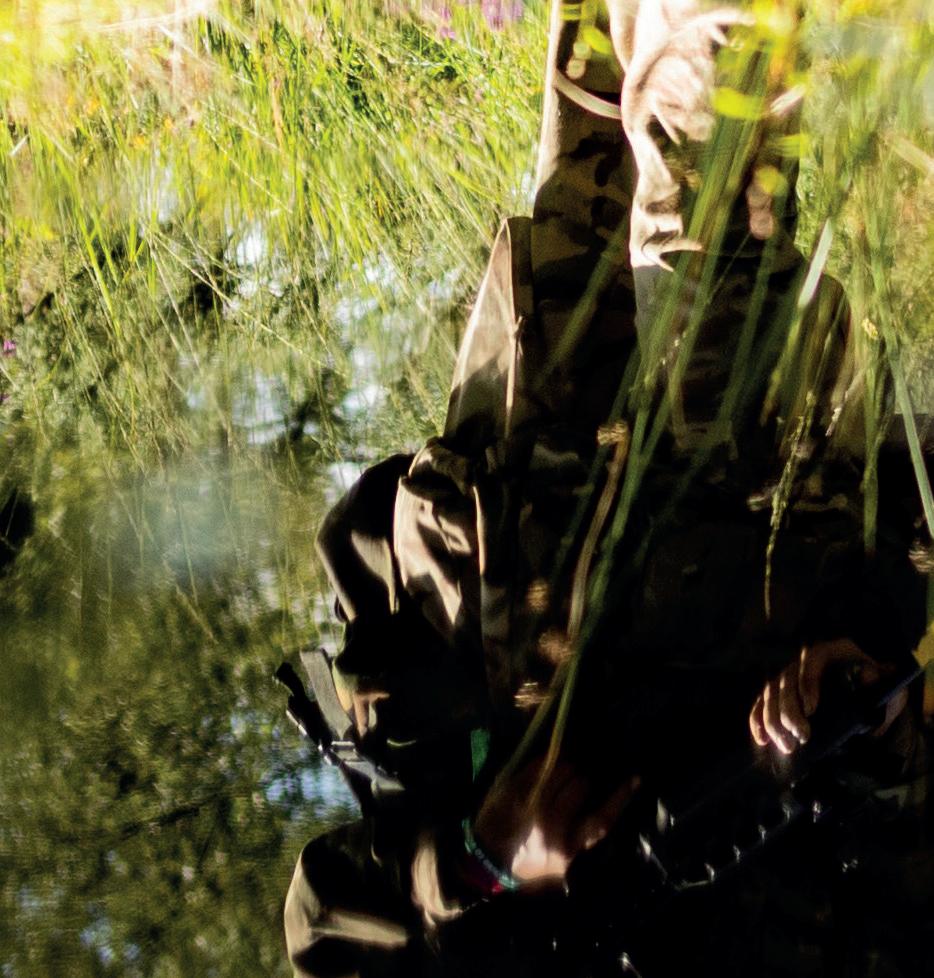








To find our more visit: armycadets.com/military
